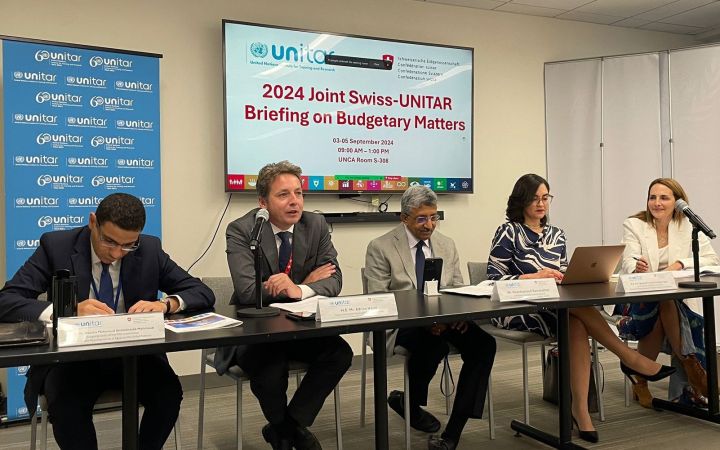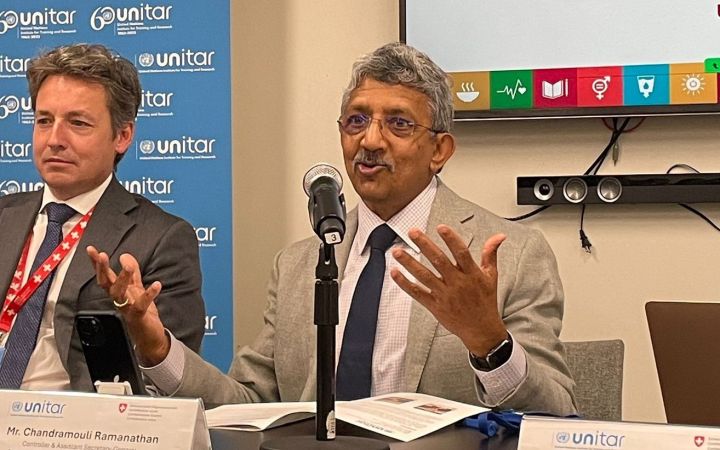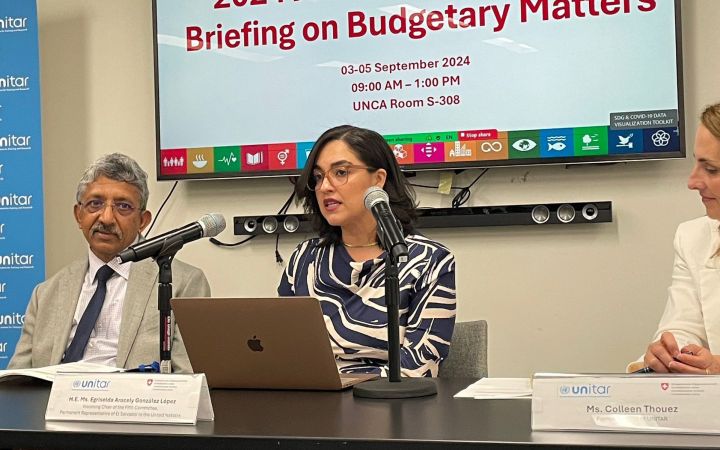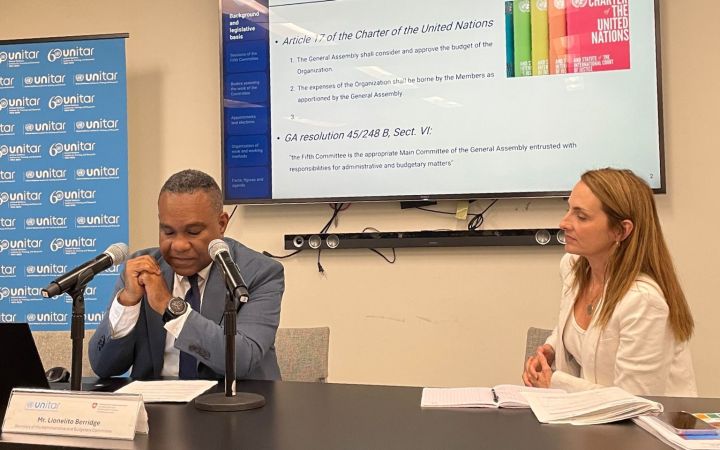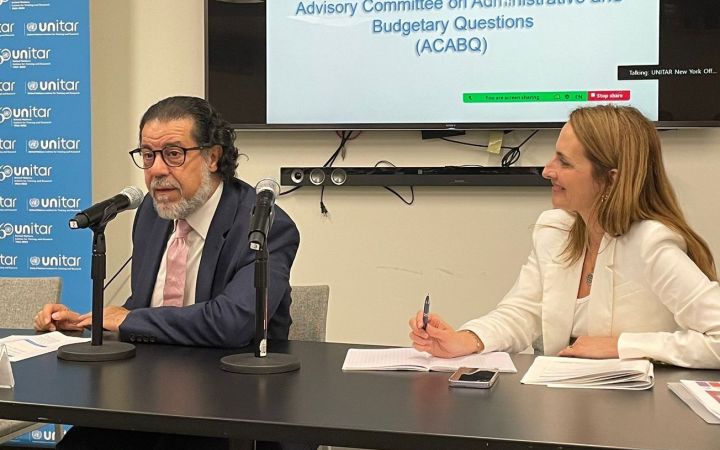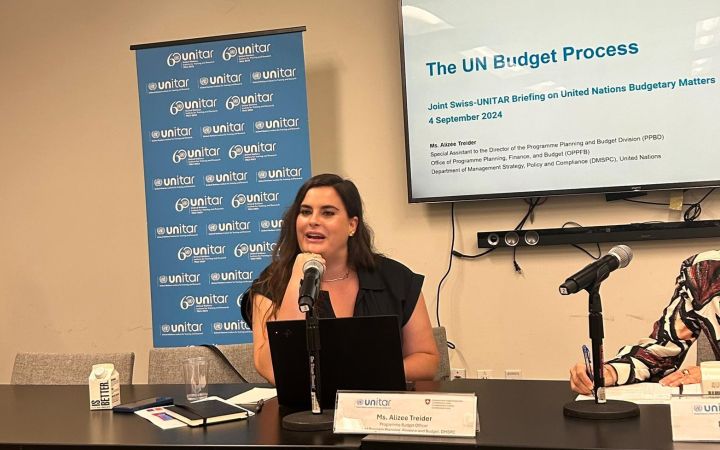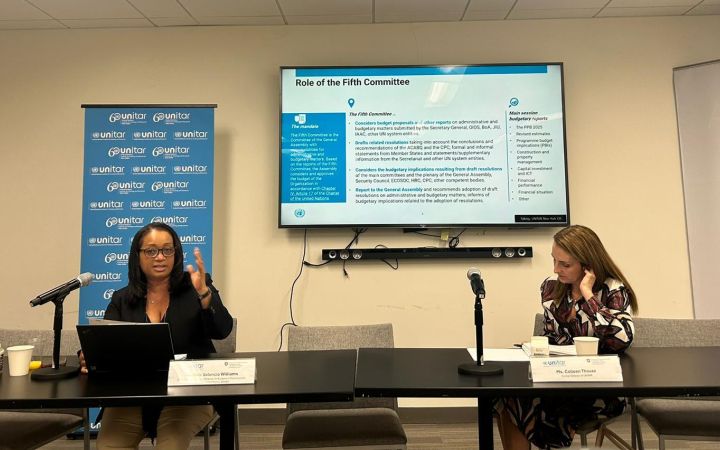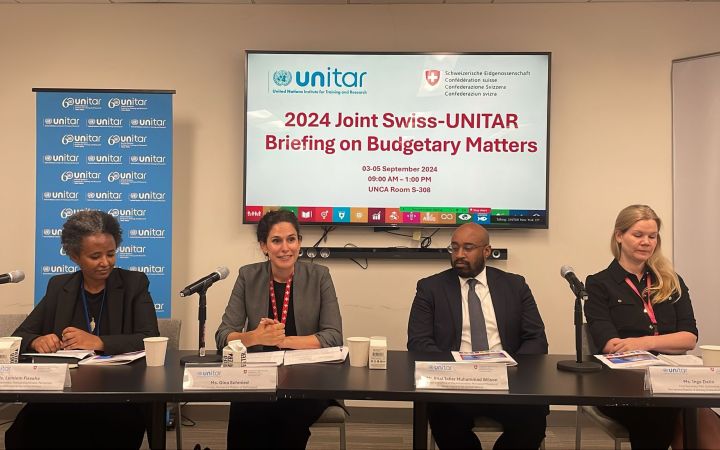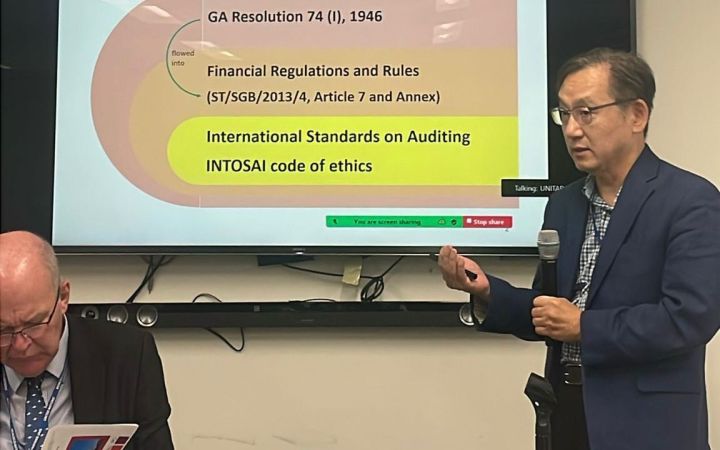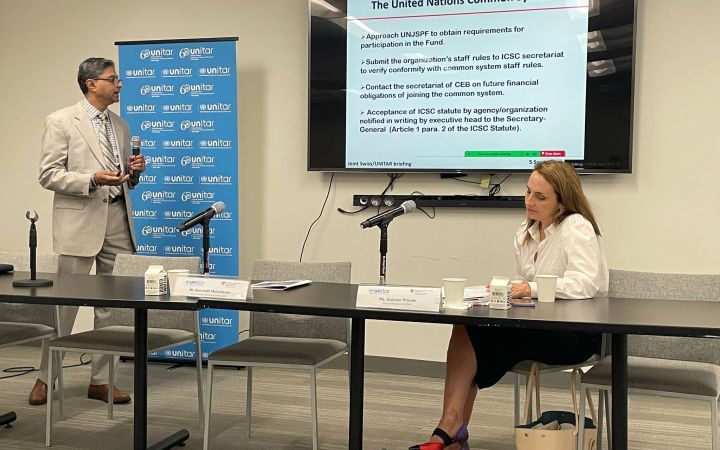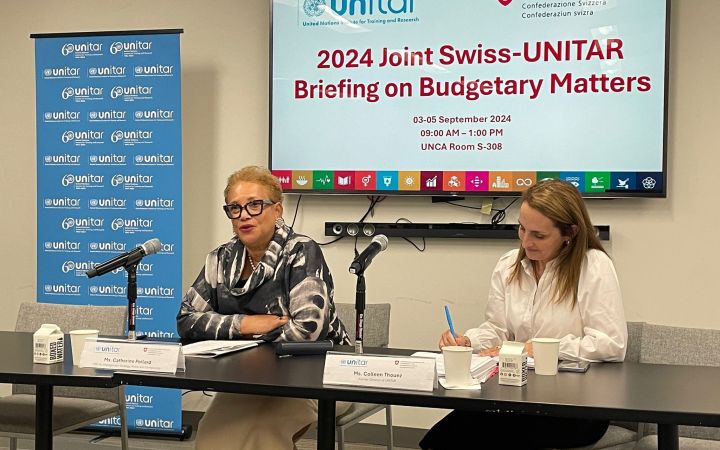03-05 September 2024, New York, New York – The United Nations Institute for Training and Research New York Office (UNITAR NYO) once again partnered with the Permanent Mission of Switzerland to the United Nations for the 8th annual Joint Swiss-UNITAR Briefing on Budgetary Matters. The 3-day briefing was held on 03-05 September 2024 at the United Nations Correspondents Association (UNCA) Room, located at the United Nations Secretariat.
H.E. Ambassador Adrian Hauri, Deputy Permanent Representative of Switzerland to the United Nations, commenced the briefing by expressing appreciation for the participants' engagement and UNITAR's efforts in organizing the event. He underscored the workshop's significance as a platform for gaining practical, first-hand insights. He remarked the goals of the briefing: “The decisions of the 5th committee are fundamental to the functioning of the UN. If the UN is a car, the 5C is the engine, and we all know if the engine is not working, the car won't get far. Some say the Security Council, for example, is the most important body of the UN -- but after 4 years at the UN and 2 years on the Council, I might say it's actually probably the 5C that keeps things running, and your work is key.”
Following his remarks, Ambassador Hauri introduced the keynote speaker, Mr. Chandramouli Ramanathan, Controller and Assistant Secretary-General for Programme Planning, Finance, and Budget in the Department of Management Strategy, Policy, and Compliance (DMSPC). Mr. Ramanathan highlighted that committees focused on budgetary matters serve as vital forums for addressing substantive questions and have seen a decrease in tensions over time. Looking ahead, he called for greater attention to investment in key areas such as physical infrastructure, building management, and cybersecurity. He also emphasized the need for increased informal briefings, field visits, and hybrid meetings to optimize efficiency. Moreover, Mr. Ramanathan stressed the critical role of a collaborative approach in negotiations to effectively manage budget allocations and address global challenges.
H.E. Ambassador Egriselda Lopez, the Incoming Chair of the Fifth Committee and Permanent Representative of El Salvador, expressed her deep enthusiasm and sense of responsibility as she prepares to assume the role of Chair. She emphasized the critical importance of the Fifth Committee’s work, which plays a central role in the financial and administrative governance of the United Nations system. Ambassador Lopez highlighted that the Committee's decisions directly impact the functioning and effectiveness of the organization as a whole. Recognizing the significance of her leadership position, she affirmed her commitment to ensuring that the Fifth Committee operates with transparency, efficiency, and collaboration to deliver the best possible outcomes for the UN and its member states. Through her stewardship, she aims to facilitate productive deliberations and foster consensus on key budgetary and administrative issues that will strengthen the overall mission of the United Nations.
Mr. Lionelito Berridge, Secretary of the Administrative and Budgetary Committee, proceeded with a detailed presentation focusing on the primary stakeholders involved in the UN Budget process. His presentation was structured into three key segments. First, he provided an overview of the Fifth Committee, which is responsible for administrative and budgetary matters within the UN. He then outlined the committee's work programme, explaining how it manages and prioritizes its tasks. Finally, he discussed the working methods of the Fifth Committee, offering insights into its procedures, decision-making processes, and how it coordinates with other UN bodies to ensure the effective management of budgetary and administrative affairs.
The final session of the first day was led by Mr. Hesham Afifi, Deputy Executive Secretary of the Advisory Committee on Administrative and Budgetary Questions (ACABQ). In his presentation, Mr. Afifi elaborated on the critical supportive role ACABQ plays in assisting the Fifth Committee's decision-making process. He provided a comprehensive review of ACABQ's key functions, its expansion over time, and the procedures for its meetings, while also outlining the general workflow through which the committee operates.
Following Mr. Afifi's presentation, Ms. Colleen Thouez, former Director of the UNITAR New York Office and moderator of the briefing, officially concluded the day by inviting participants to ask any questions. After all inquiries were thoroughly addressed, the first day’s session was formally brought to a close.
The second day of the briefing was led by Ms. Alizee Treider, Programme Budget Officer at the Office of Program Planning, Finance and Budget, Department of Management Strategy, Policy and Compliance (DMSPC). The presentation covered key aspects of the UN’s budgetary process, starting with the legislative framework, financial regulations, and rules that guide its financial management. It outlined the budgetary cycle and sequencing, explaining how the budget is developed, reviewed, and approved. Key concepts and terminology were clarified, and the overall budget level was discussed, along with the mechanisms for monitoring and reporting to ensure transparency. The session also highlighted the role of intergovernmental deliberations in financial decision-making, culminating in the General Assembly's responsibility for approving key budgetary matters.
The session continued with Ms. Unis Valencia Williams, Chief of Service and Deputy Director for Budgets of the Development Pillar and Human Rights in the Department of Management Strategy, Policy, and Compliance (DMSPC). She focused on the resolution process, particularly the drafting of budgetary resolutions for the Fifth Committee. Ms. Williams began by outlining the legislative framework, then detailed the development of a resolution document, its structure, and the critical role of precise language in drafting effective resolutions.
Mr. Weiyi Xiao, Chief of Service Management and Programme Analysis, delivered a comprehensive presentation on the budgetary processes governing Peacekeeping Operations and Special Political Missions. He provided an in-depth explanation of the unique financial structures and planning mechanisms involved in these critical areas, highlighting the complexities of managing large-scale, global operations within the constraints of the UN budget framework. Mr. Xiao elaborated on the lifecycle of the budgeting process, from initial resource allocation and financial planning to monitoring and reporting on expenditures. He emphasized the importance of efficiency and transparency in ensuring that peacekeeping and political missions are adequately funded to fulfill their mandates while maintaining accountability to member states. His presentation offered valuable insights into the intricate balance required to manage resources effectively in dynamic and often unpredictable environments.
The second day concluded with an innovative “Ted Talk” style session featuring experienced delegates from the Fifth Committee, moderated by Ms. Gina Schmied, Counselor for the Permanent Mission of Switzerland to the United Nations. The guest speakers, invited to share insights from their work in the Fifth Committee, included Ms. Lemlem Fisseha, Minister Plenipotentiary and Political Coordinator of the Permanent Mission of Ethiopia; Ms. Inga Dalin, First Secretary for the Fifth Committee of the Permanent Mission of Norway; and Mr. Bilal Taher Muhammad Wilson, Expert and representative of the Office of the Ambassador for the Permanent Mission of Saudi Arabia to the United Nations.
The third and last day started with Mr. Kevin Summersgill, Officer-in-Charge of the Business Transformation and Accountability Division, who gave an introduction to the oversight bodies. Mr. Sejong Lee, Executive Secretary of the Board of Auditors (BoA), presented a PowerPoint to explain how the BoA conducts external audits of the United Nations' accounts, including its funds and programs. He highlighted that the BoA reports its findings to the General Assembly and plays a key role in supporting the UN by fostering strategic thinking, strengthening governance, enhancing accountability and transparency, and improving the delivery of services on the ground.
Following Mr. Lee's presentation, the floor was given to Ms. Carolina Fernandez Opazo, Chief of the Joint Inspection Unit (JIU), who outlined the UN's oversight mechanisms. She explained that the JIU is the only independent external oversight body in the UN system, with a mandate to conduct evaluations, inspections, and investigations across the entire system. Its mission is to address cross-cutting issues and serve as an agent of change, promoting greater efficiency and effectiveness within the United Nations system.
After the break, Mr. Ramnath Mahadevan of the United Nations International Civil Service Commission (ICSC), provided an overview of the ICSC. He explained that the Commission makes recommendations to the executive heads of UN organizations, particularly on human resources policy matters. Following his presentation, Mr. Remo Lalli, Secretary of the High-level Committee on Management (HLCM) and Director of the Geneva Office of the CEB Secretariat, discussed the role of the UN System Chief Executives Board for Coordination (CEB).


